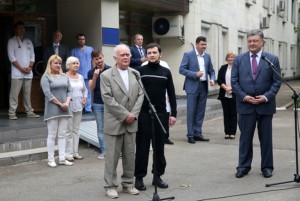After an alarming sequence of politically motivated arrests and freedom of speech violations, Russia is now suggesting stepping up control over Ukrainians who travel to Russian-occupied Crimea.
This proposal was put forward by Andrey Komissarov, Deputy Head for Control of Monitoring, Analysis and Prognosis at the Russian Federal Agency on Affairs of Nationalities, Russian news agency TASS reported on Dec. 16.
“When forming the migration system in Crimea, its strategically important position and conflicting relationship with neighboring Ukraine should be taken into consideration,” he said.
Komissarov suggested “developing measures for strict records of people arriving from Ukraine to Crimea and to control their stay on the peninsula”. He also talked about the “increased threat of terrorist attacks from Ukrainian subversive groups,” something Russia’s FSB Director Alexander Bortnikov also mentioned on Dec. 13.
Russia says it arrested groups of Ukrainians on the peninsula in August and November, accusing them of being involved in terrorist plots. It also accused Ukraine of abducting two Russian soldiers to exchange for the Ukrainians being held in Russia. Ukraine denies all three charges, and says the two soldiers defected to Ukraine voluntarily. Ukraine’s Ministry of Defense had previously referred to the accusations as “Russian propaganda.”
The proposals to increase control over Ukrainians who travel to Crimea come just days after Amnesty International published a report on Dec. 15 which raised serious concerns over the persecution of the ethnic Crimean Tatar population and other dissidents: “Crimea: In the dark – the silencing of dissent.”
“The cases documented in this report demonstrate the ruthlessness of the Russian authorities in brooking absolutely no dissent to their rule in Crimea,” said John Dalhuisen, Director of Amnesty International’s Europe and Central Asia Program.
Former political prisoner and Crimean photographer Hennadiy Afanasiev described the situation in Crimea at a press conference in Kharkiv on Dec. 16.
“It has been 1,000 days since the peninsula was occupied… Arrests continue. At the moment there are 44 Ukrainian political prisoners in Russia, which includes 37 Crimeans,” he said.

Yuriy Soloshenko and Hennadiy Afanasiev speak to press after they were released from Russian captivity in Moscow on June 14. (Anastasia Vlasova)
Afanasiev was arrested in May 2014, just months after Russia annexed Crimea. He was convicted of “organizing a terrorist group in Crimea”, and sentenced to 7 years in prison in Moscow. Afanasiev was then released as a part of a prisoner exchange between Kyiv and Moscow in June 2016.
The case was widely believed to be fabricated by human rights groups, who pointed to the lack of evidence.
At the Kharkiv press conference Afanasiev also spoke about the militarization of factories in Crimea and the creation of a new association called “The People of Crimea,” which according to him pursues a “Machiavelli-style colonization, resettling people from different Russian autonomous republics to Crimea.”
